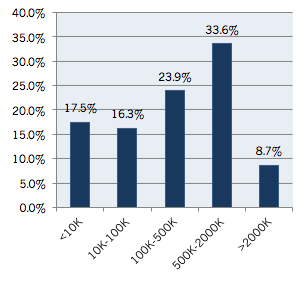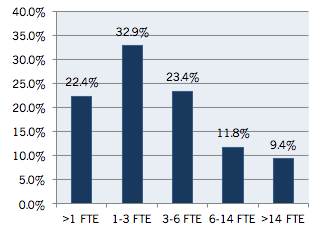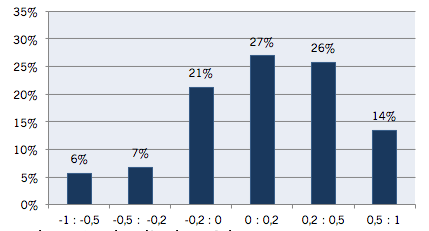Big money buys influence in Brussels. Or does it?
In Brussels, big corporations can buy influence – and the VW emissions scandal proved it. Or at least that’s the received opinion about lobbying. But Bas Redert looks at the relative success of big and small lobbyists and finds that public opinion, not the size of their budgets, is the salient factor when it comes to influencing EU and Commission policy. Because of this, interest groups may be more democratic than they first appear.

Photo: Hamish Irvine via a CC-BY NC 2.0 licence
Lobbyists have a bad reputation. If you ask ordinary people their opinion on lobbying, they invariably say that industries and big companies have too much power. Most assume that the corporate world, with its big financial resources, can ‘buy’ European policies.
‘Dieselgate’, the Volkswagen emission violation scandal, painfully bore out this assumption. In September 2015 the United States Environmental Protection Agency found that some VW vehicles possessed software that could detect test situations, and change the level of CO2 emissions accordingly. One of the reasons this could happen, according to MEP Bas Eickhout, is the significant influence the German car industry has on the European decision-making process, with Volkswagen alone having an annual lobbying budget of €2.8m. The German car lobby was able to stall negotiations about new and better types of emission tests for about seven years.
Examples like these stir up the discussion about the impact lobby groups have on the EU’s democratic credentials. Interest groups constantly try to influence the democratic process by inserting themselves into the debate, bypassing the public’s voice. Of course, citizens can organise themselves to do the same, but companies and industries with big wallets seem to overrule these initiatives. At least, that is what popular notions about lobbying tells us.

Figure 1: Distribution of proportion of financial resources spent on lobbying (€)
In my research I demonstrate that money and staffing levels do not make interest groups more successful. Public opinion, on the other hand, turns out to be very important. Whether public opinion opposes or supports an interest group can break or make its lobbying strategy. This is particularly crucial in dossiers with a high public salience, meaning that European citizens are involved and informed regularly via (social) media. In highly salient dossiers, politicians are extra sensitive to the opinions of voters. After all, politicians want to reassure their constituents that they are acting in their best interests. In this way, public opinion makes itself felt in the opinions of politicians.
In my research, I focused on the General Data Protection Regulation (GDPR), an extensive dossier on the protection of personal data. This piece of legislation is seen as an essential step towards the strengthening of citizens’ fundamental rights in the digital age and the facilitation of business by simplifying rules for companies in the EU. Furthermore, the regulation eliminates the fragmentation of laws on personal data across European member states and administrative burdens that constrain businesses. I compared the initial plans of the European Commission, described in the Comprehensive Approach (COM(2010)609 final), with the final proposal of the Commission (COM/2012/011 final). These two documents differ as a result of a public consultation, meaning that the Commission asked for input of stakeholders in the form of position papers. Comparing the 120 written position papers to the final proposal resulted in an overview of the successes of interest groups. After the successes were determined, various factors – like annual budgets and the number of full time jobs (FTE) – were mapped.

Figure 2: Distribution of proportion of time spent on lobbying (FTE)
The identification and categorisation of the different interest groups give a good insight of the arena of the GDPR. Figure 1 and Figure 2 show the distribution of the financial resources and manpower. Looking at Figure 1, one can conclude that a rather large portion of interest groups have low to moderate resources, ranging from less than €10,000 to €500,000. Of course, a number of interest groups, including Facebook and Google, had enormous budgets of over €2m. But they amount to a mere 8.7 percent of the total sample. A remarkable finding emerges when looking at the total FTE of involved interest groups. A rather large group of stakeholders spend 0.2 of their FTE on lobbying activities – meaning that in a five-day working week, a single employee can spend a full day on these activities. Furthermore, a fifth of interest groups have small ‘armies’ of lobbyists, ranging from 6 to more than 40 FTE. Figure 3 shows the distribution of the success rates of the lobby groups. Out of all the stakeholders, about two thirds had a positive score, meaning that their tactics worked or were more or less successful.
The best-off interest groups did not have more success. On the contrary, a rather big portion of successful interest groups had only small budgets and limited staff time.
This does not mean that the size of a lobbyist’s budget makes no difference. When I shared these results with various interest groups, they pointed out the Janus-like nature of financial resources. Although money cannot ‘buy’ policy, interest groups with sufficiently large budgets can simply lobby more and do so more easily. They can, for example, rent an office in Brussels, which increases their visibility and accessibility to politicians. Moreover, they can commission studies by well-known research institutions, adding more legitimacy to their case when they try to influence politicians and policymakers.

Figure 3: Distribution of interest group success
Yet the better-off groups are not necessarily more successful. For example, the European Privacy Association (EPA) – which lobbied for broader and deeper data protection for individuals in the EU – and the European Federation of Associations of Market Research Organisations (EFAMRO), which lobbied for the protection of anonymous data, were more successful than the large industries. Many of these small NGOs made their voices heard without expensive extras and were victorious in the end, all because of extensive media coverage and attentive politicians.
What does this mean for lobbying in general? It mainly shows that interest groups might be more democratic than one would expect at first glance. As long as interest groups can make their voices heard without the help of a big budget, lobbying can be a healthy part of the democratic process. So, instead of operating solely behind closed doors, lobby groups have to step into the light and face the European people.
This post represents the views of the author and not those of Democratic Audit.
 Bas Redert is studying for an MSc in Political Science at Antwerp University. His master’s thesis analyses the use of lobbying strategies by the City of London in the context of Brexit.
Bas Redert is studying for an MSc in Political Science at Antwerp University. His master’s thesis analyses the use of lobbying strategies by the City of London in the context of Brexit.





 Democratic Audit's core funding is provided by the Joseph Rowntree Charitable Trust. Additional funding is provided by the London School of Economics.
Democratic Audit's core funding is provided by the Joseph Rowntree Charitable Trust. Additional funding is provided by the London School of Economics.
The problem with arguments about lobbying that simply relate to hard cash or the supposed wealth and muscle of a lobbyist is that they miss a key point – free media coverage has enormous value, and can be quantified in cash terms as a value for those running a campaign. Regular free coverage of your campaign on state radio and tv is worth millions, but it has little to do with democracy and more to do with the news priorities of deeply flawed media which in fact have no real or serious commitment to ‘democracy’, just to sensation and to flying their own personal flags of beliefs and priorities.
TV almost always will give coverage to some matters but will bar others with just as much credibility from their screens. Media coverage itself is also little to do with democracy, and that is always apparent to those who views are attacked – it is to do with what those who own or run the media decide to cover and what they decide to bar from our screens. As the media has been shown to be as biased and flawed in its priorities as the political class, this means that lobbying that gains media coverage is not so much a reflection of how the system is working, but a reflection of what the media wants to be heard. Those lobbying are just gaining from an unfair and unbalanced system… they are not some glorious demonstration of democracy in action.
And that is not good, or fair, or correct…and it certainly does not reflect ‘democracy’. The reason why social media is having such an impact, even with the dire and chaotic nature of its supposed ‘news’, is that the old and tired media, always arthritically championing one side or another, have manifestly failed to convince people any more. Even state radio and tv in countries like the UK are seen as biased and oppositional to some points of view.
The real issue is that the unelected and undemocratic Eu should not be in a position to control the content of secretive and anti-democratic ‘trade deals’ like TTIP, forcing policies and inadequate structures onto member states like secret courts, all at the behests of big moneyed lobbyists whose actions (like those they are lobbying) are shady and unaccountable. No amount of tortuously distorting that into some sort of ‘democracy’ will wash any more.
Thank you for your comment. I fully agree with you on the point that media, whether traditional or new, play a vital part in the perception of political parties, policies and the political system as a whole. The choices that media make have to be taken seriously and should be seen as actions with great political consequences. And since these actions are not taken by elected entities and cannot be controlled by the public, one could argue that these are undemocratic.
However, looking at interest groups’ activities concerning media, a different view arises. A substantial amount of academic research has been conducted on the interaction between interest groups and use of media. One of the main findings is that while well-endowed, institutionalized interest groups prefer inside lobbying strategies – meaning that they will try to convince the politician directly – while interest groups with less resources use media and public campaigns to raise awareness and stir up public debate.
Your example of the undemocratic control of the European Union on the TTIP-agreement came into the light of European citizens via actions of interest groups. Groups like ‘Stop TTIP’ and ‘Foodwatch’ communicated their positions via the media and raised awareness among the public. Furthermore, they managed to stir up public debate about the desirability of TTIP.
I think this proofs that lobbying can, in fact, influence politicians in a good way. Especially in the EU where distance between voters and policymakers is huge, debate and political contestation are more than welcome. Therefore, interest groups are not “tortuously distorted” into a form of democracy, but are a vital and essential part of democracy that in particular the EU could not miss.